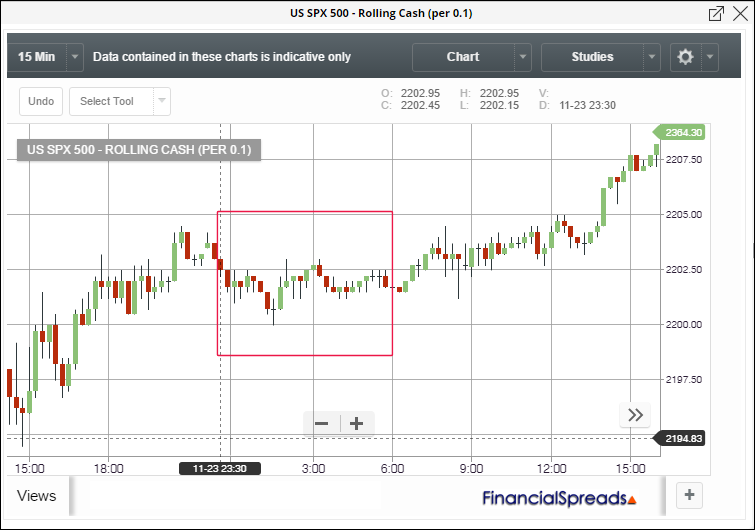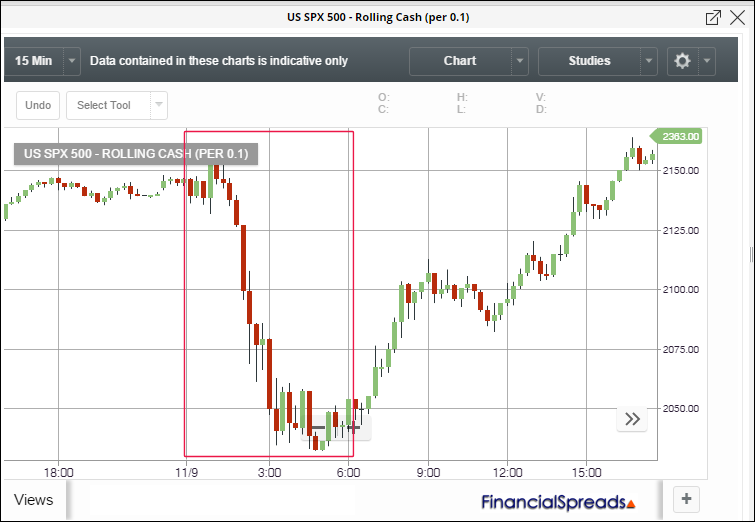Most spread betting companies offer “24 Hour” trading on a number of their more popular markets and this is “mostly” a good thing for investors.
The Benefits of 24 Hour Trading
Fairly obviously, 24 hour trading allows you to trade the markets when the underlying markets, e.g. the London Stock Exchange, have closed.
This let’s investors react to news that comes out when the markets would otherwise be closed.
Why stop speculating on the value of the UK stock market at 4.30pm when the US markets are still in full flow?
Why stop trading forex or gold or crude oil when those markets continue around the clock in other countries / time-zones?
Spread Betting and CFD Companies that Offer 24 Trading
The following firms offer these quasi-24 hour markets but only on the more popular markets.
Don’t expect round-the-clock trading on single shares. No firm is currently stupid enough to offer that.
- arrow_forwardFinancial Spreads
- arrow_forwardCMC Markets
- arrow_forwardCity Index
- arrow_forwardSpreadex
It’s Not Quite 24 Hour Trading!
When the brokers offer 24 hour forex markets these are typically open from about 11pm on a Sunday and trade right through to about 9pm on the following Friday (UK time).
With commodities and stock indices it’s a slightly different story. These markets will close for a break each evening.
I’m told this is to help settle some markets. That’s ‘settle’ as in ‘close some trades’ rather than ‘getting the markets to chill-out’.
Note that there is an “Oi markets! chill-out!” function but that’s called going “Limit Down” and is a separate story.
I digress.
Anyway, expect the commodities and stock indices to close each evening.
E.g. Financial Spreads will close their 24 hour stock markets from 9.15pm to 9.30pm & again from 10.15pm to 11pm.
Your Trading Costs Can Increase During 24 Hour Markets
The spread betting and CFD firms incur larger risks during the small hours (their data isn’t as good and there are fewer places for them to hedge off their positions).
To compensate for this, they often charge a wider spread during the small hours.
E.g. Financial Spreads don’t change the spreads on their overnight forex market because they still have plenty of market data (and price feeds) to work from.
However if you trade the FTSE 100 then their normal 0.8pt spread will move to around 4 or 5pts between 9pm and 7am UK time.
Where Does 24 Hour Trading Go Wrong?
The small issues:
- warningThe spreads, and therefore cost of trading, will often increase outside market hours – see above. Having said that, paying an extra 4 points to get in or out of the occasional trade isn’t that bad. For high frequency traders, the cost of the wide spreads will quickly rack up.
- warningNot all markets are offered 24 hours (although many of the popular ones are)
-
warning“24 hours” is not really “24 hours” but… it’s pretty close
The Big Issue = More ‘Market Making’
-
warningThe primary problem for investors is that the spread betting companies are far more likely to be creating their own prices.During the small hours there is often no underling market and no price feeds for the companies to base their prices on.
Therefore the companies have to act as a Market Maker if they want to offer a market.
 Zeen's Automatic Middle Of Content Ad Feature
Zeen's Automatic Middle Of Content Ad FeatureFirms like IG, Financial Spreads, City Index, CMC Markets, Spreadex etc. are authorised by the FCA to be Market Makers so that they can create their own market / prices if they want.
And this is what normally happens during the overnight session of their 24 hour markets, particularly with the stock index markets like the FTSE 100, Dow Jones, S&P500 and DAX 30.
With forex markets and commodities, it’s more likely the firms can get a price feed and less need for them to act as a Market Maker.
OK – So What’s the Big Problem?
The issues always occur when a company’s pricing is easily influenced during small trading volumes and spike up or down.
As an investor, it often feels like that spike goes through your Stop Loss and closes your trade… only for the overnight market to quickly return to the original point.
It’s very difficult for clients who feel aggrieved to argue against these moves.
I’ve worked at, and with, a few firms. I’ve never heard of any firm actively moving their market in order to close clients’ trades. Of course, if it was happening, any such policy would be very hush hush.
I have seen a firm actively move their special markets though e.g. IPO markets. That is fine as long as the move is genuine and not designed to catch out traders.
And… the re-positioning of the specials markets wasn’t a quick spike and… the firm still offered a two-way price. If the new price was that wrong, clients had time to buy/sell the market accordingly.
Putting the specials markets to one side though… whilst I’ve never seen or heard of the firms consciously moving markets against client positions I think it’s only a matter of time before we have evidence that 1 or 2 firms do it (particularly the non-FCA regulated firms).
Chart Showing Muted Overnight Trading
It’s not always that exciting overnight, you often see the chart below, i.e. somewhat muted trading.

Of course, overnight trading on 8 November 2016, when the Donald Trump win was a bit of a shock, we saw the chart below.
Being able to trade the news in the small hours can have its advantages.

Overnight Financing Charges vs 24 Hour Markets
The overnight financing charges are a bit of a red herring with 24 hour markets.
If the markets closed at 4.30pm, like they do with UK shares, and you keep your trade open overnight then you still need to pay the overnight financing fee.
It doesn’t matter if the market is 24 hours or not, if you keep your trade open overnight then you are charged the overnight financing fee. Having said that, financing fees are normally the baserate + 2.5% and that’s a pretty fair cost.
Also, the financing fee is often charged at around 11pm (it’s rarely charged at midnight, it’s easier to make charge when the markets close for a short break). So if you open trades in the small hours there is no financing fee unless your trade is still open circa 11pm the next evening.
Weekend Financial Markets
- arrow_forwardMost markets will shut around 9pm on Friday
- arrow_forwardMany markets will open again around 11pm/midnight on Sunday
- arrow_forwardIG offer a few Sunday markets, see sunday stock market trading

